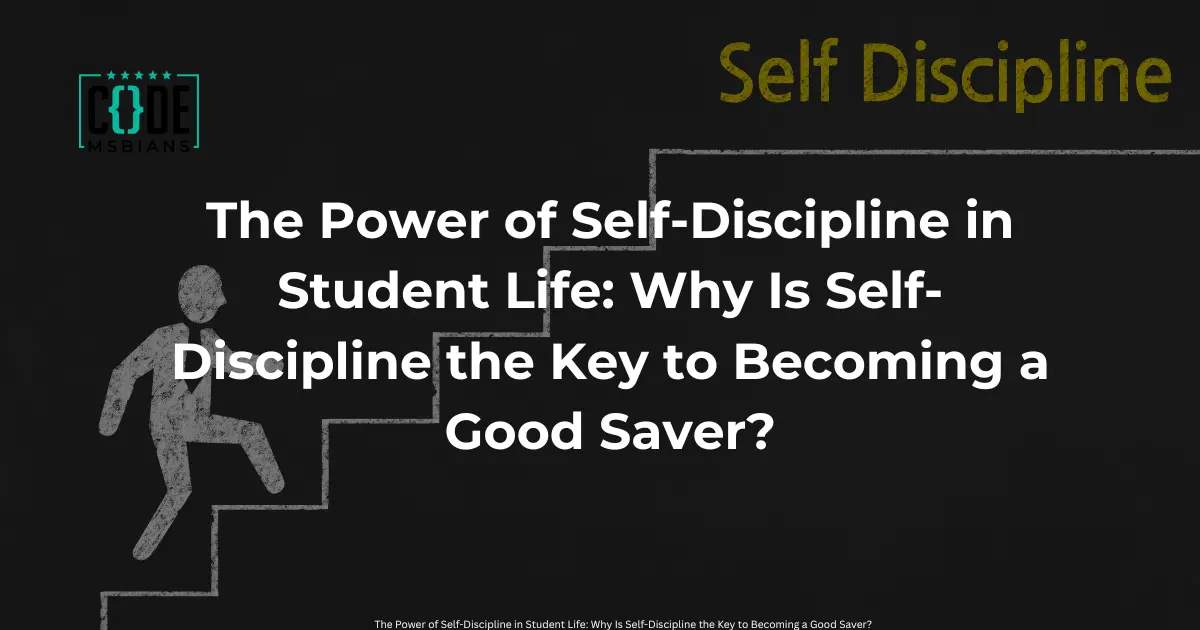In today’s fast-paced and distracting world Why Is Self-Discipline the Key to Becoming a Good Saver?, mastering self-discipline is one of the most powerful skills a student can develop.
Whether it’s in education, health, or finance, self-discipline plays a key role in long-term success. But have you ever wondered why self-discipline is important for becoming a good saver?
This blog explains how self-discipline helps students build smart financial habits, manage their time better, and live a more successful life.
What is self-discipline?
Self-discipline means having control over your actions, emotions, and impulses.
It’s the ability to do what needs to be done, even when you don’t feel like doing it. While motivation can come and go, discipline keeps you going.
For students, self-discipline is the foundation of every good habit – whether it’s completing homework on time, avoiding distractions during study hours, or saving money instead of spending it impulsively.
To becoming a good saver, Why is self-discipline called key ? Let’s look at how discipline helps students manage money wisely even with limited resources:
1. Resisting impulse purchases
Every student faces temptations—junk food at the canteen, tempting toys, or online deals.
Self-discipline helps resist these short-term desires and focus on long-term goals.
It allows students to ask themselves, “Do I really need this?”
2. Planning for bigger goals
Students with discipline often save money for meaningful things—a new bicycle, a school trip, or a birthday gift for a parent. Instead of spending every penny, they set aside money for important goals.
3. Practicing delayed gratification
Learning to wait is a powerful skill.
Self-disciplined students understand that saving ₹10 a day can add up to ₹300 a month. This practice of delayed gratification is the key to building wealth—even as adults.
4. Tracking expenses
Being aware of how much you earn (even as pocket money) and where it is spent is part of discipline.
Students who keep track of their spending habits are more mindful of their decisions and avoid waste.
Self-discipline is more than just saving money
Financial habits are just the beginning. Self-discipline touches every area of a student’s life:
✅ In studies
Disciplined students follow study routines, complete assignments on time and revise regularly. They avoid distractions and manage their time effectively.
✅ In health
From getting proper sleep to eating on time and exercising, a disciplined lifestyle keeps the body and mind strong.
✅ In digital habits
Students with self-control avoid excessive screen time and choose educational content instead of endless scrolling.
When discipline becomes a part of daily life, success becomes a natural result.
How students can develop self-discipline and become better savers
Discipline builds gradually and requires consistent effort over time.
Students can start like this:
🎯 1. Set small savings goals
Saving ₹5 or ₹10 a day might not seem like much, but over time it adds up. Establish goals for the week or month and make an effort to follow through.
💰 2. Use a storing bank or savings app
Use physical jars, envelopes, or digital apps to separate your savings.
Label them based on your goals—like a new book fund, a birthday gift fund, or an emergency fund.
⛔ 3. Delay every purchase
Whenever you feel like buying something, wait 24 hours. Often, you’ll realize it wasn’t that important.
📒 4. Track your spending
Keep a simple notebook or app to record your daily expenses. Tracking your spending can provide surprising insights.
🏆 5. Reward yourself wisely
Once you reach a savings goal, reward yourself. But do it within the budget. This teaches smart spending, not total denial.
How parents and teachers can help
Discipline is not just a student’s responsibility. Parents and teachers can play a big role in guiding them:
👨👩👧 For parents:
Encourage kids to handle small amounts of money and keep track of their spending.
Teach them budgeting by involving them in family shopping.
Give small rewards for consistent saving habits.
Avoid unnecessary criticism – focus on progress, not perfection.
🧑🏫 For teachers:
Incorporate life skills like budgeting and goal setting into classroom activities.
Use group discussions or games to make self-discipline fun.
Praise disciplined behavior publicly to motivate others.
Remember, children imitate what they see. Adults should model the discipline they want students to learn.
Common mistakes to avoid
When trying to build self-discipline, avoid these common mistakes:
❌ Being too strict: Discipline should be flexible and realistic.
❌ Expecting results overnight: It takes time to build habits.
🚫 Avoid comparisons—each individual progresses at their unique speed.
❌ All work, no fun: A balanced routine also includes rest and fun.
Conclusion
So, why is self-discipline important to be a good saver?
Because saving money requires patience, awareness and conscious decision-making – all of which come from self-discipline.
The sooner a student learns this, the more financially secure, focused and confident he or she will be in life.
Be it managing studies, time or money – discipline is the secret weapon that helps ordinary students achieve extraordinary results.
Start small, be consistent and see how discipline changes your life – one wise decision at a time.




